'Black Mirror' creators want Barack Obama for season six (exclusive)
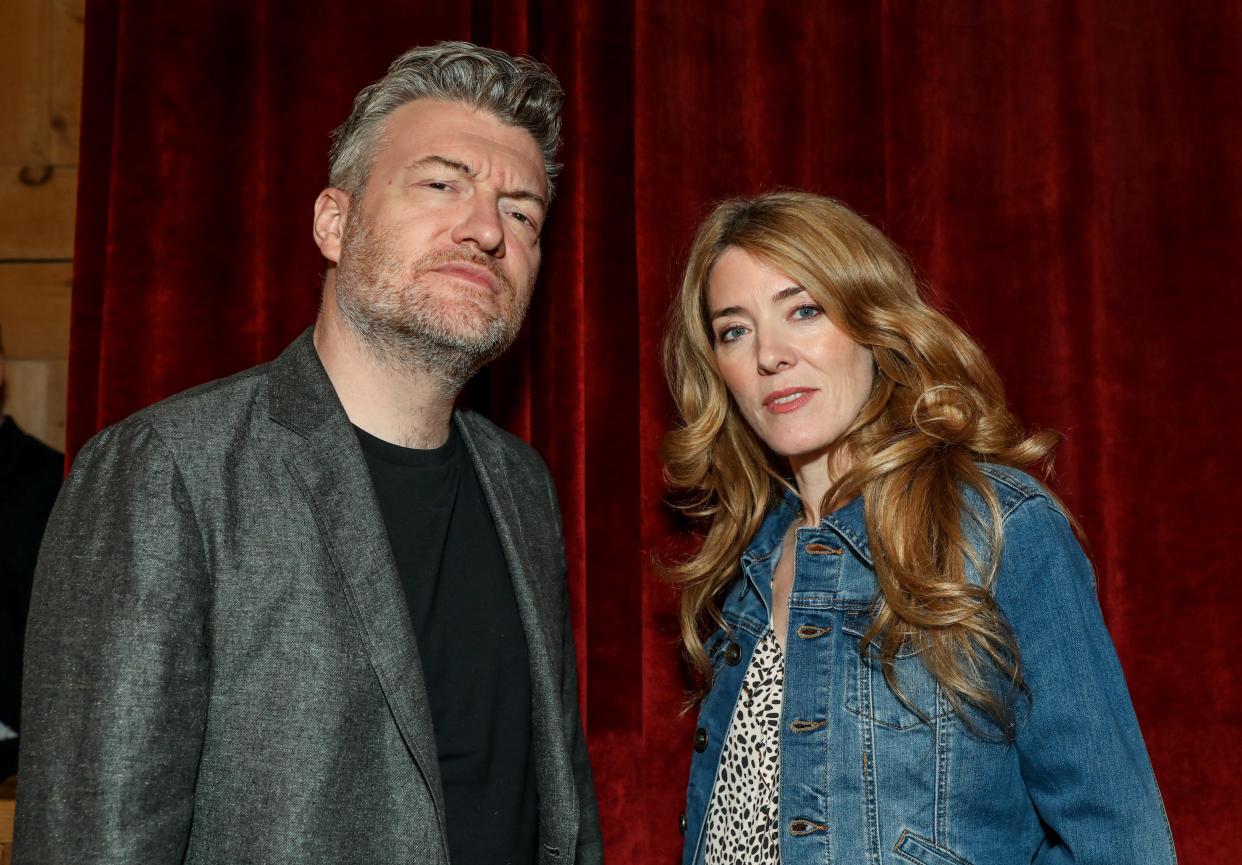
Black Mirror is returning to Netflix for its fifth season, and it boasts the series’ most A-list cast yet.
The lineup of actors in the upcoming three-episode series includes Miley Cyrus as a pop star not unlike her Hannah Montana persona, Ashley O, in the witty music-industry romp ‘Rachel, Jack and Ashley Too’. Avengers star Anthony Mackie joins the series in ‘Striking Vipers’, alongside Aquaman’s Yahya Abdul-Mateen II, an emotional story of the mundanity of life and the escapism a VR fighting game brings. And fresh from his official global status as “Hot Vicar” in Fleabag, Andrew Scott stars in the episode Smithereens as a carshare driver with a hidden agenda.
However, if the show’s creators got their way, series six could take things to another level entirely.
“Maybe we should cast someone like Barack Obama, he'd be good,” Charlie Brooker, head writer and producer on Black Mirror, tells Yahoo Movies UK.
“Shall we put him in the American version of ‘The National Anthem’, the pig one?” suggests producer Annabelle Jones.
“It'd immediately be a sexier episode,” quips Brooker.
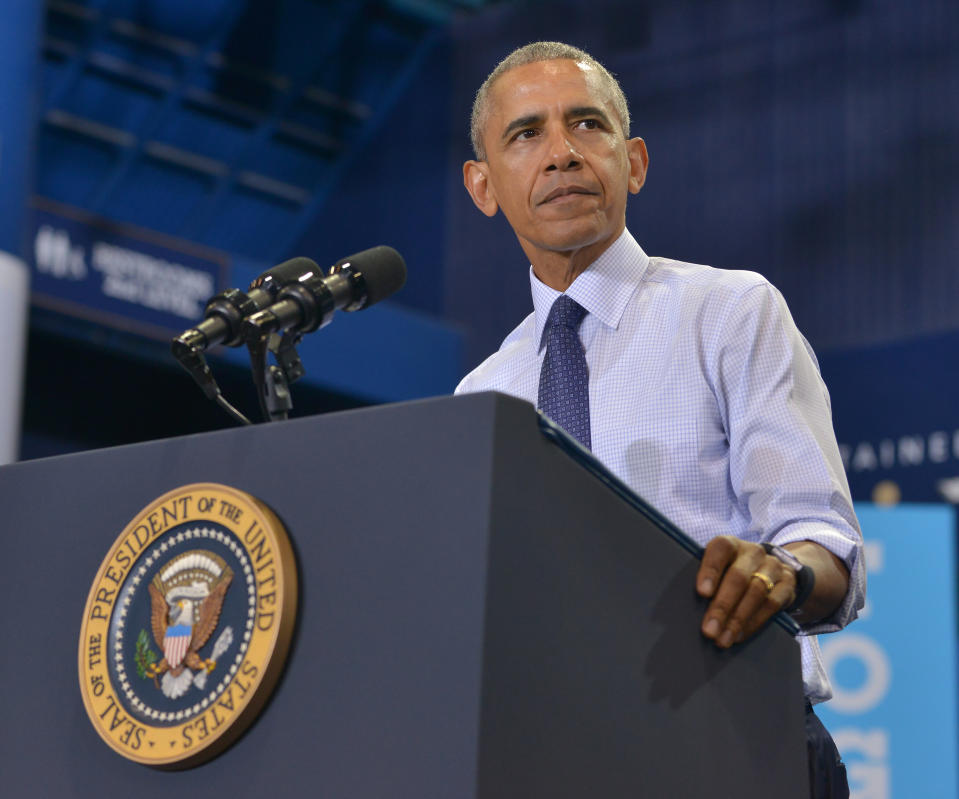
The new season comes hot off the back of the January release of the never-before-seen, choose-your-own-adventure interactive storytelling of Black Mirror’s BAFTA-nominated ‘Bandersnatch’, and it gives us three of the series’ strongest anthology films so far.
We spoke to Black Mirror creators Charlie Brooker and Annabel Jones about the hidden music industry details which Miley Cyrus added to the show and their future ‘Bandersnatch’-style experimental ideas to push the boundaries of filmmaking even further…
Yahoo Movies UK: Season 5 of Black Mirror has some huge stars. How does that casting process happen?
Charlie Brooker: We’ve got a great casting director called Jina Jay, who has a very good eye and knows how to make all of that happen. And then for Miley Cyrus, when I was writing that script, ‘Somebody like Miley Cyrus be perfect for this role!’ We didn't think we'd get Miley Cyrus. But as a long shot, we sent the script to her agent, thinking it’s like buying a lottery ticket that we are definitely going to lose. But she quite quickly got back to us because she'd seen the show and didn't think it was awful.
Read more: Stop taking Black Mirror so seriously, says creator
Annabel Jones: But also, from what we knew about Miley, she always makes very interesting choices in her career. She never likes to be labelled. And she had has had, in some ways, a similar trajectory to the Ashley O in the film. And so we thought if you can have someone who can sing and command that sort of fandom in the real world, then that's going to translate to the screen. If ever there was going to be an intelligible international pop star who brought the authenticity, but also was going to have something to say about the state of the industry, she was going to be bold enough to do it.
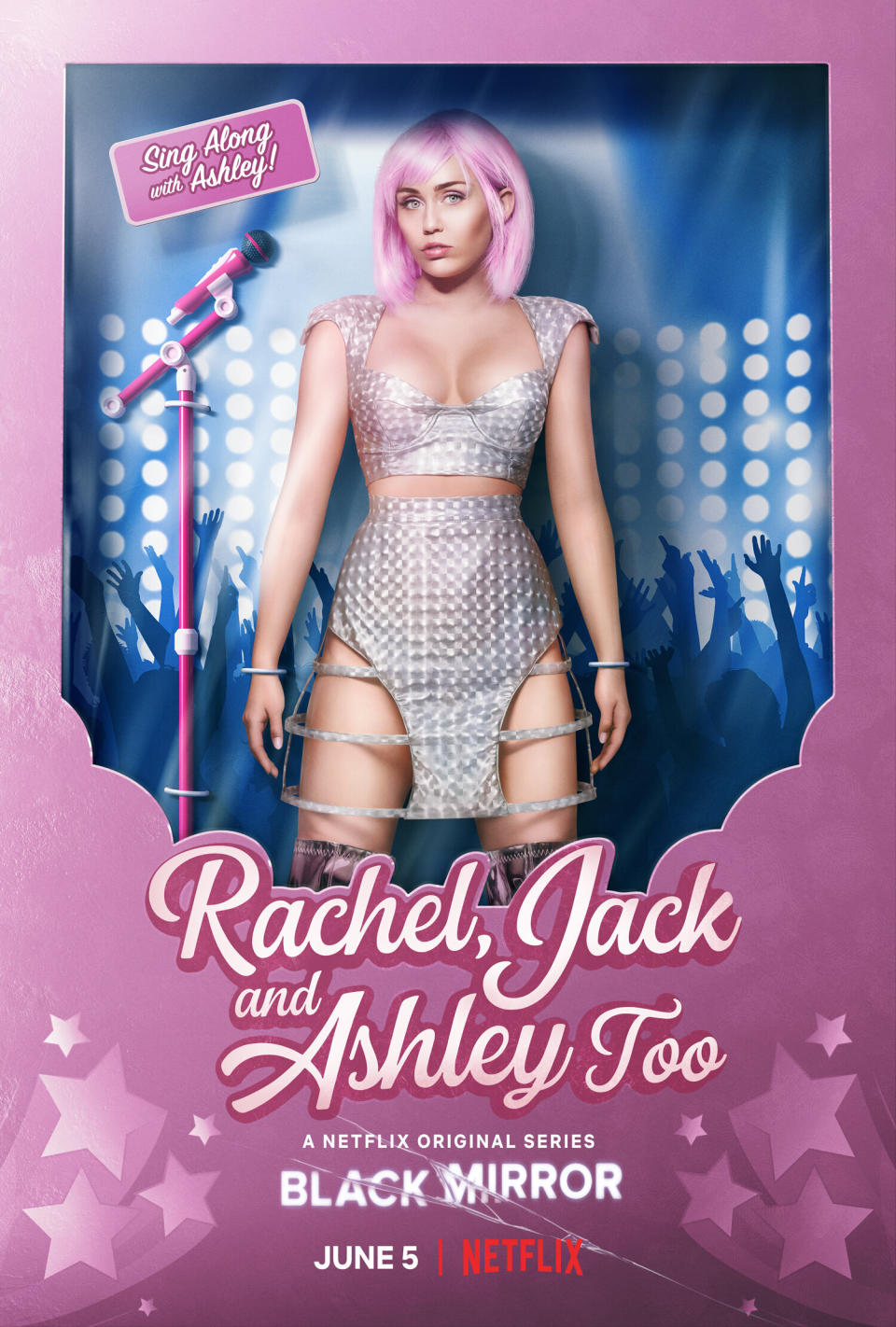
But running through the whole film are quite depressing observations about the music industry, what it means to be an artist in a world of AI, where suddenly entertainment can be created through AI computers or your music can be exploited, or your image can be exploited after you've died. The whole control over your work, for an artist, is being questioned and challenged on a daily basis. And that absolutely spoke to Miley who, of course, has gone to great lengths to control her image and her art and her work.
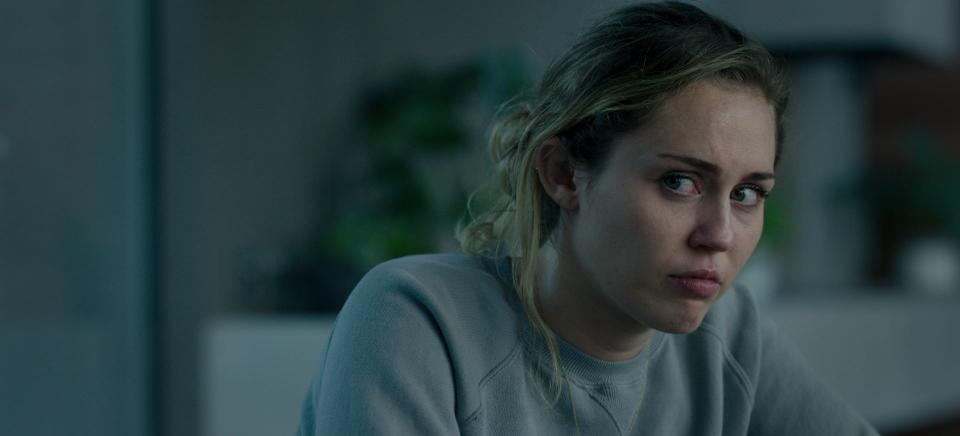
So we thought we had a chance with Miley and, and thankfully, the film spoke to her. When we Skyped her, she talked a lot about her understanding of the industry and things that she was going through, and added a lot of flavour and detail into the film. It became a much richer and more realistic film as a result.
CB: That was one of the things we did as soon as we got word back that she liked the script. We all hopped on a Skype. Obviously, that's quite surreal, that suddenly you’re Skyping Miley Cyrus. It was very apparent very quickly that Miley is a force of nature, and she's got a very good sense of humour. For somebody who has that life, she's very grounded, and doesn't seem to take herself too seriously.
AJ: She's not particularly earnest, which is a good fit for Black Mirror. She wanted to satirise, she wanted to essentially be putting two big fingers up to the industry and to be doing her own thing. It was a perfect marriage, tonally.
Is there a particular detail in the film that she brought to the film from her own experiences?
CB: I was struck by several things she said that ended up in the film. She was talking about how she did a gig, where she'd gone on stage and been a guest performer for an act that was of an older generation, and their audience was probably, people in their 40s. And she was struck by the fact that she'd walked out on stage, and she could actually see the faces of the audience rather than their phones. She found it quite emotional.

AJ: She recognised her audience and they were having a relationship, a shared experience.
CB: Even though that wasn't her natural audience, because they were older people. Which is not to say that she wants to ban phones at gigs. It was just more that she was struck by what a human moment it was, and that had affected her quite a lot. I mean, it's all quite heightened, but there were a lot of things that chimed with her experience. And that's also that's really good to know, as the writer, because you're like, ‘Oh, thank f*ck for that!’
Do you have a wish list of actors you'd like to be in future episodes?
CB: Well, we've ticked off a lot of that list. Sometimes there's people that we wanted to work with who for schedule reasons or what have you, it hasn't worked out, and then sometimes we then get them later. Like, Letitia Wright, who was in the episode ‘Black Museum’. We’d wanted her for an episode once before, and then her schedule meant that we couldn't get her and that was very disappointing. So we were delighted when we got her for the next season. Other than that, who would be great to work with? Maybe we should cast someone like Barack Obama, he'd be good.
Read more: Keanu in talks for the MCU
AJ: Shall we put him in the American version of ‘The National Anthem’, the pig one?
CB: It'd immediately be a sexier episode.
AJ: Than our British David Cameron? Not that it's based on David Cameron. Well, let's see if we can Skype with Obama and pitch it to him!
The interactive episode, ‘Bandersnatch’, was released at the beginning of this year and it was so innovative. Five months on, how have you found the reception to it?
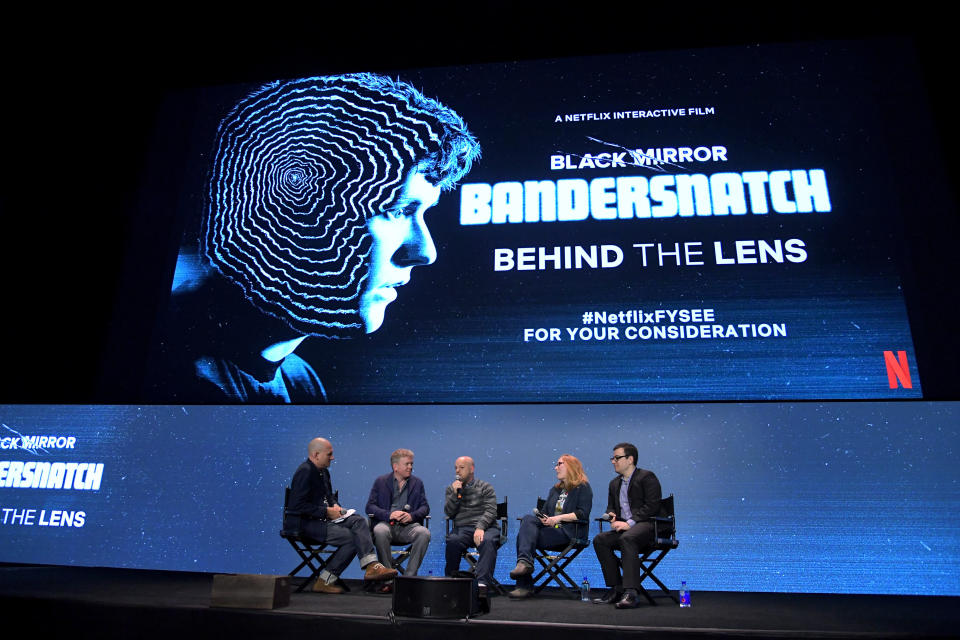
AJ: Ah, relief! For us, it was quite an experiment, quite risky. In that, you don't quite know if anyone's going to want to engage with us. It was the first live action, interactive thing that Netflix had done. And so you’re second guessing how people are going to engage with it.
So we thought, all we can do is, in Black Mirror fashion, try and come up with a compelling story and a character that you care about and earn the right for it to be interactive. And then once you've once you've established that, try and create a trajectories or branches that feel true to that character, and make Stefan feel at the heart of it.
To feel that every branch you go down, you are revealing more about his character or you're adding more to his predicament, so his emotional trajectory still feels as it lives on a similar arc. I think the fact that we were nominated for a BAFTA for Best Single Drama hopefully shows that we did achieve that. So we’re delighted, really.
CB: It's interesting that that people have different responses to it, obviously, based on what choices they made in it. Some people said, I just wanted to give Stefan a happy ending! In which case, we think, both, A) Have you seen Black Mirror? and B) Good, we succeeded, because you cared about him. Because there was a danger where in a lot of games, the lead character is just a vessel, basically, because your character is defined by their actions.

And because you're deciding their actions, they're a hollow character most the time. Because Stefan is slightly separate from your actions, and he's fighting against them, it means that he's always a consistent character. So there was a danger, that you wouldn't have cared about any of the characters, and you'd be overwhelmed by what became a gimmick. That was something we were very mindful of. So we were delighted that people were actually responding to the story and not just feeling it was a game. Although I love games.
Following ‘Bandersnatch’, are there more experiments you want to try in the future?
CB: We really want to make an episode out of wool. We're going to do an episode that's side on… two dimensional, but side on. So it's just a line in the middle of the screen, and you can't see anything, you just keep trying to crane your neck round for a look. And then we'll do an episode that exists as nothing but one small noise.
Read more: Bandersnatch star quits social media
But no, there are all sorts of other ideas came about during the making of ‘Bandersnatch’ which we may get to in the future. The thing is, if you're doing an interactive episode, it needs to justify itself. There needs to be a compelling narrative reason as to why you're using that otherwise, it is just a gimmick.
With that level of interactivity, being more interactive than any film before it, I wondered what your thoughts were, with people feeling an entitlement to control the narrative of other shows – for example the petition going around to rewrite the last season of Game Of Thrones?
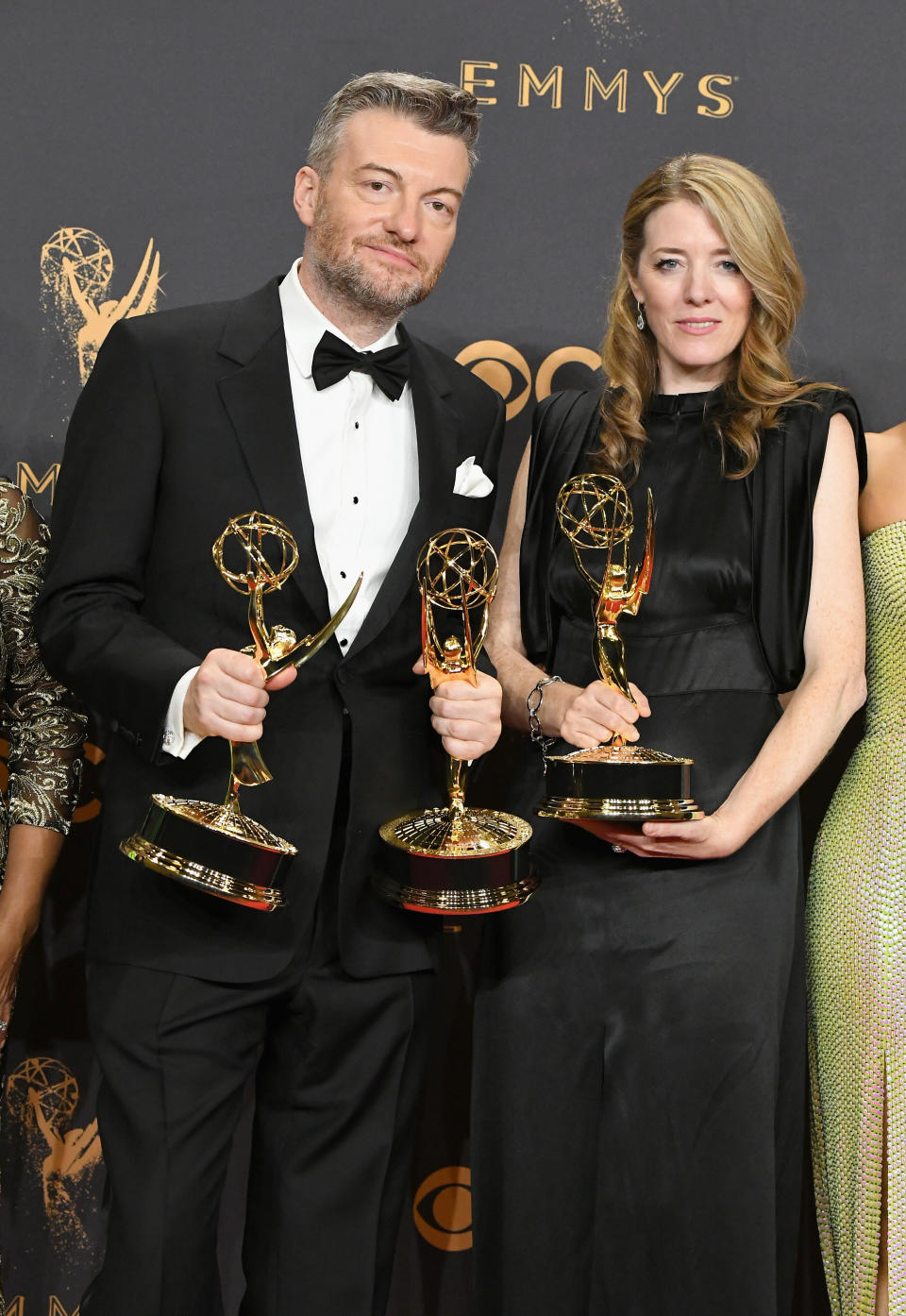
CB: Well wait until they try to decide what ending they want. And then you've got a ‘Bandersnatch’ situation. I thought, considering the complexity of what they'd set up and the time in which they had to end it, that the final scenes were very good. I think that's just like people collectively coming out of the cinema and going to each other, ‘Here’s what I think should have happened’. I think that's all that's going on there. It's just a global conversation.
AJ: And they've been in that cinema for 10 years.
CB: And they've all been driven mad, so they're angry. I mean, the point at which people are getting angry and saying, ‘I demand that this gets rewritten!’ That's just psychosis.
AJ: I think it's a sign of how passionately they've cared felt about the series.
I understand that emotional investment.
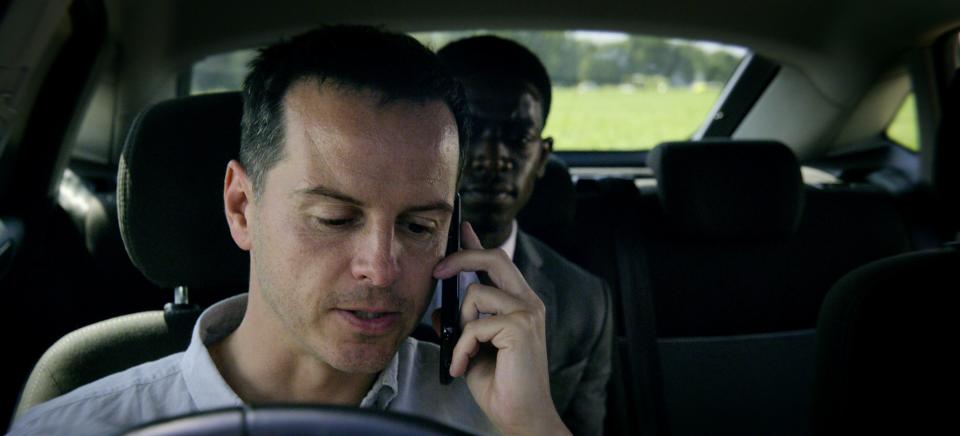
Do you think that other series could be improved with a ‘Bandersnatch’-style, choose-your-own finale?
CB: The news?
AJ: So Bear Grylls’ You Vs Wild is doing very well. But it's different. There are things that lend itself to interactivity, like Bear Grylls, or Kimmy Schmidt’s upcoming interactive episode. And I'm sure they'll have loads of fun with it, because it will be it will be very aware that there's the interactivity, and it may be fourth-wall breaking.

CB: If The Simpsons did an interactive episode, you could imagine how they'd have lots of clever jokes about it.
AJ: But I can't imagine there are going to be many straight character-driven films that are able to pull it off because of that need to keep your character consistent. And that's difficult to do in a branching narrative where they make totally arbitrary decisions.
CB: 24. You could do an interactive episode of 24.
AJ: Which is essentially Bear Grylls, but more heightened.
CB: But I wouldn't let my kids watch interactive 24 because Jack Bauer does things like saws people's heads off and breaks their fingers, doesn't he?
AJ: So the interactive choice is: Saw Head or Break Fingers?
Obviously with an anthology series, there’s the possibility to go on on telling different stories forever. Do you see an end point to Black Mirror?
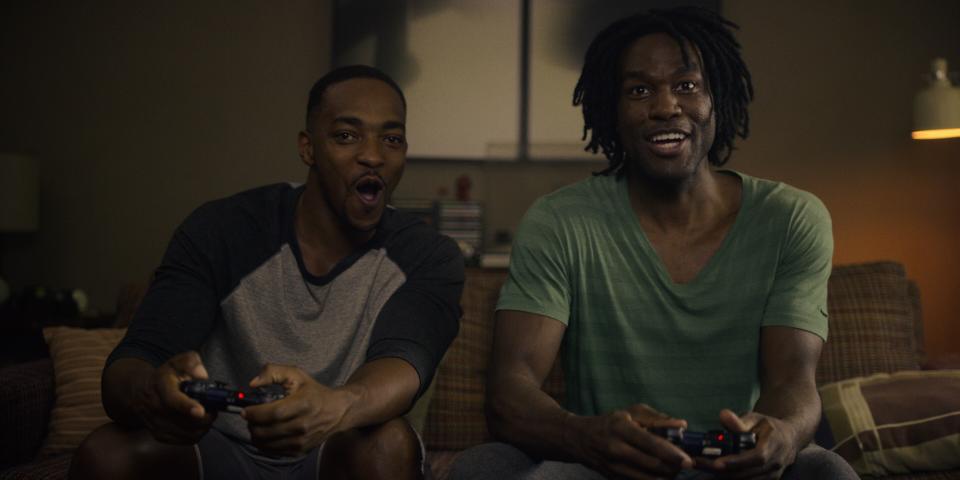
CB: Eventually the planet will crash into the sun, and there will be an end to all life on earth. And probably eventually, there will be the heat death of the entire universe.
AJ: But I fear Black Mirror will still be going on. But yes, I imagine if we run out of ideas, we will stop. But technology is still changing so rapidly. And our relationship with it is ever-evolving, so there will always be stories to tell.
Read more: Netflix’s Dark Crystal prequel gets a trailer
CB: Also, the stories aren't really about technology; they're about people. And so as long as there are people… if there were no people, there'd be no audience making the show for and we'd have bigger fish to fry actually, if we were facing that kind of extinction, than making our silly programme.
There are always going to be human dilemmas. We use technology in the show like other shows might use the supernatural or magic or something like that to give the characters unusual dilemmas. And so as long as there are human problems, we hopefully will carry on having stories.
The all-new season of Black Mirror launches Wednesday, 5 June, exclusively on Netflix.

 Yahoo Movies
Yahoo Movies 
